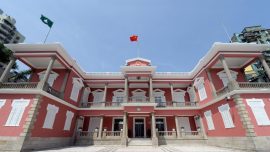The International Organisation for Migration (IOM) on Friday encouraged the Portuguese presidency of the EU Council to press ahead with an “ambitious” and “forward-looking” reform of European migration policy, which is essential for post-Pandemic recovery.
In the IOM recommendations addressed to the six-monthly EU Council presidency of Portugal, released today, the United Nations agency drew up four policy lines focusing on migration issues: “Promote the systematic inclusion of reintegration assistance as a bridge between return and sustainable development”,
“Promote the development of comprehensive agreements for the resumption of international human mobility for social and economic recovery”,
“Strengthen legal paths to protection” and “Promote skills-based partnerships and links between labour mobility, integration of migrants and social inclusion policies”.
“Our recommendations converge on the idea that integrating migration and reinventing mobility across various sectors – including health, climate, development and the digital agenda – can help us recover from the pandemic and strengthen our approach to the challenges ahead,” said IOM Director, António Vitorino.
In this regard, the former Portuguese minister and IOM leader since 2018 stressed that it is “crucial” for both migrants and societies that the Portuguese presidency “move forward in negotiations to implement the key principles of the migration and asylum pact presented by the European Commission last September.
IOM believes that finding ways to facilitate human mobility and cross-border trade in a coordinated way will be essential to recover from the economic crisis triggered by the current health crisis.
According to the organisation, such an approach will also enable migrants to continue to contribute to long-term sustainable development in both countries of origin and host countries.
To this end, the IOM encourages the Portuguese presidency to adapt immigration and border management systems in a coordinated, health-sensitive and forward-looking manner.
“The EU’s transformation towards a Digital Europe can lead to the launch of innovative digital tools that support migration processes, increase security and protection of identity, and provide passage without physical contact that reduces health risks”, reads the IOM paper released today.
This idea was reinforced by António Vitorino: “Collective investment and global coordination of health security across borders and sectors will be key to ensuring that no country moves away from global human mobility in the future”.
“To demonstrate solidarity with partner countries, the IOM calls for a dialogue between EU member states to increase resettlement and resettlement efforts within a lasting and predictable European framework,” the IOM paper continued.
The Agency also stressed that a “resilient Europe” will depend on flexible and accessible migration channels based on skills which are mutually beneficial, which target migrants at all skill levels and which protect their rights.
“It is also important to strengthen cohesion in European societies and communities by promoting the integration of migrants through wider social inclusion”.
In conclusion, the IOM Director-General stressed that a successful (post-Pandemic) recovery will depend, in addition to other aspects, on how migrants are included in future strategies and planning, including national vaccination campaigns.
“Today this means, for example, including migrants in European Covid-19 vaccination campaigns to ensure the health and safety of all,” he said.
“The IOM is ready to help the Portuguese presidency, the EU and its member states to cooperate better to ensure safe, orderly and regular migration”, he concluded.




















